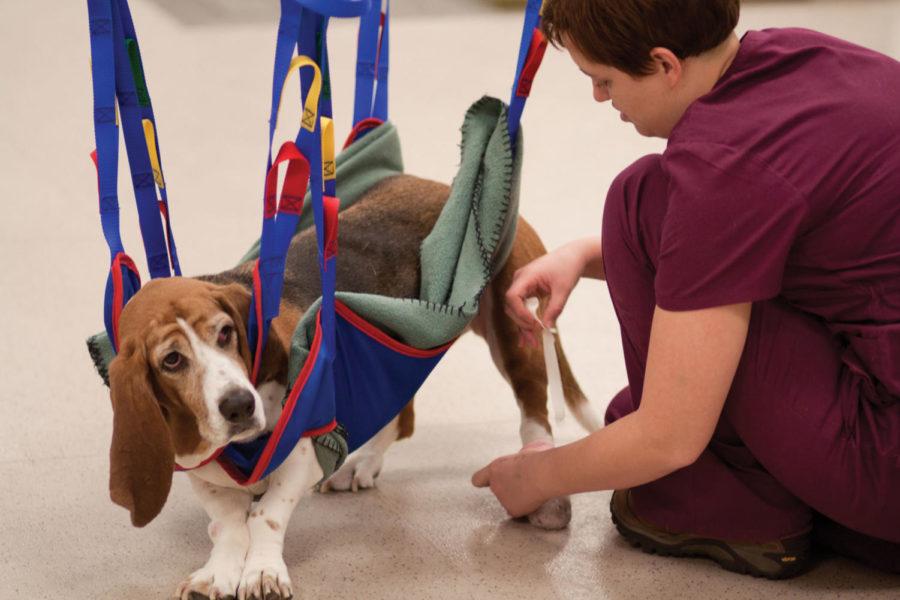Learn about College of Veterinary Medicine’s application process
Photo: Amber Hovey/Iowa State Daily
Canines during a rehab therapy session at the Canine Rehab Center. Canine Rehab Center is at the small animal hospital at the college of Veterinary Medicine on November 1, 2011. A fourth year Veterinary Medical student working with a dog named Lily at the Canine Rehab Center in the small animal hospital at the college of Veterinary Medicine. Lily is put in an hoist that allows her to move around because she cannot walk on her own.
March 21, 2013
Iowa State’s College of Veterinary Medicine is one of the most sought-after veterinary colleges in the country, receiving approximately 800 to 1,000 applications each fall.
It is highly competitive, with only 120 of the applicants accepted into the program.
Students thinking about applying for veterinary college have many things they can do to stand out among the crowd of applicants.
The application process is a complex one, consisting of a committee, interviews and several screening processes.
Claire Andreasen, associate dean for Academic and Student Affairs, oversees the application process.
“We use a national system, and students can choose how many veterinary schools they want to apply to, and then the national system automatically sends the applications to the specific veterinary schools,” Andreasen said.
Once the applications are received by the ISU College of Veterinary Medicine, the screening process begins.
“We have three people who screen the applications to make sure they meet the minimum requirements,” Andreasen said. “After they are screened for the requirements, we have a committee that reviews them.”
Applications are randomly assigned to committee members, which consists of faculty members, veterinarians from the state of Iowa and veterinarians from the National Animal Disease Labs.
“We definitely try to have diverse backgrounds on the committee because our students have diverse interests,” Andreasen said.
During the screening process there are many requirements that are closely looked at, including grade point average, particularly science GPA, work experience, references, and knowledge of the veterinary medicine field and practice.
Alex Hohman, senior in animal science, has been accepted into the ISU College college of veterinary medicine for fall 2013.
Hohman did many things to stand out on her application.
“I decided to get a second degree in nutrition science to get a different perspective,” Hohman said. “I was also involved with the pre-vet club for a while. I worked as a veterinary assistant, worked in an animal lab for Dr. Ellinwood and also worked as a horse-hand exercising yearlings in the Mason City, Clear Lake area.”
Hohman said the application process was a “long process but definitely worth it.”
There are some aspects of the application that the committee does not discriminate against, including previous colleges attended by the student.
“We’ve done a lot of statistical experiments to see what matters, and students do just as well, who attended community college, as those who attended a four-year college,” Andreasen said.
Once the applications have been screened by the committee and have made it through several cuts, the interview process can begin.
“It’s the really fun part,” Andreasen said, smiling.
The interview process is conducted by a completely separate committee than those who review the applications.
“What we’re trying to do with the interview process is keep it completely separate so that the students can really present themselves, and the committee won’t have any preconceived ideas about them,” Andreasen said.
The interview process and questions are behavioral, so there are no wrong answers.
The interviews are meant to observe and get to know the students’ communication and judgment skills.
“The interview process was more behavioral,” Hohman said. “It wasn’t so much about what technical skills you have, but more about what you know and how you would use it.”
The interviews are the most important part of the application process because it’s all about getting to know one another.
“We’re interviewing the students, but they’re also interviewing us,” Andreasen said. “They need to see if we have what they’re interested in, and if they feel it’s a good fit.”
There are many things students can do to stand out among the applicants if a student is wanting to apply to veterinary school. Networking and work experience are among the most important.
“I would say that if you don’t interact or know three different professors who are distinct in your field of interest who can write recommendations for you, then you need to get more involved,” Hohman said.
Work experience is also very important to demonstrate you have a good foundation and knowledge in the field.
For more information on what it takes to stand out on an application or what it takes to be accepted into veterinary college, the ISU College of Veterinary Medicine is having an open house on April 20, 2013, hosting a seminar on applications and answering any questions students may have about the process.







